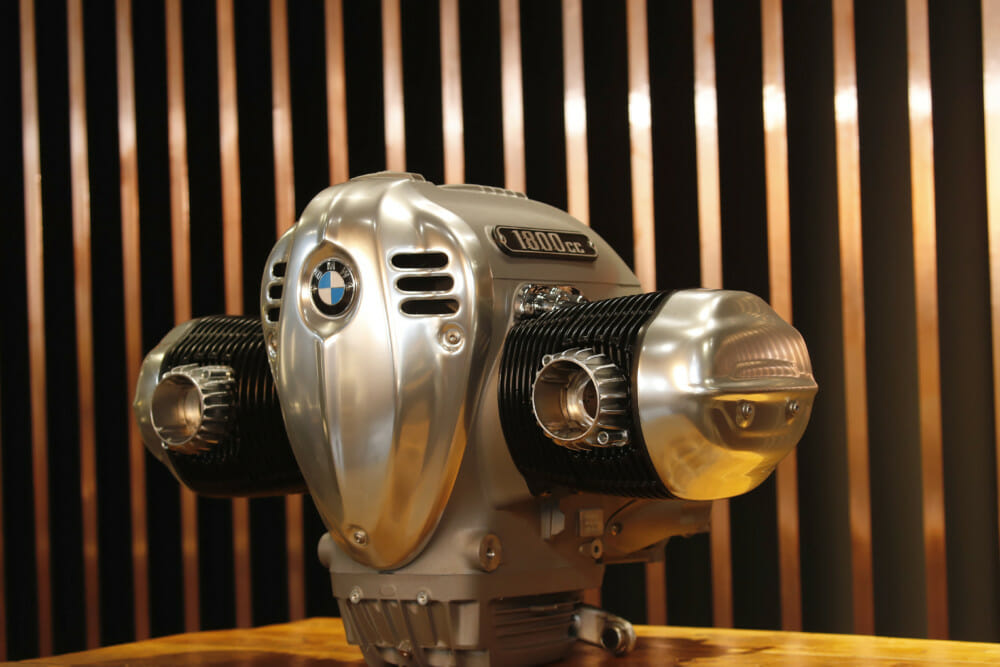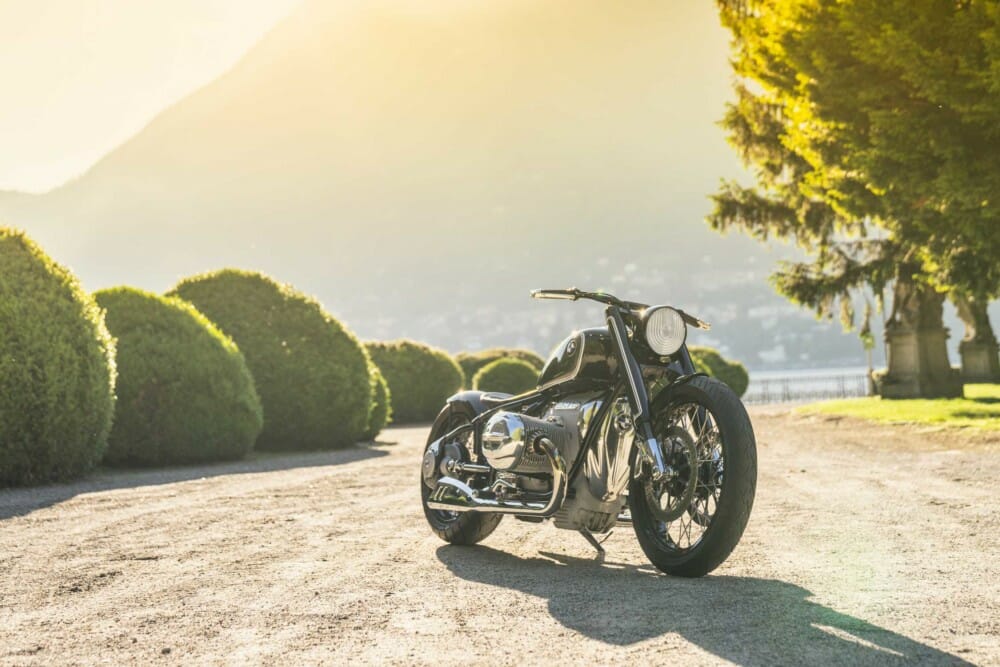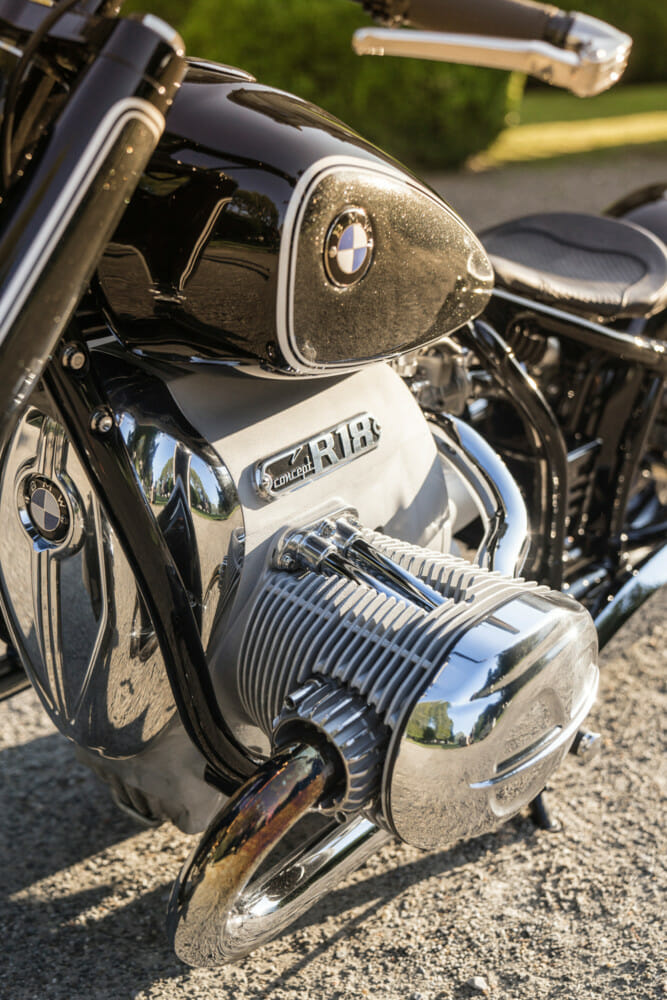Press Release | December 10, 2019
The “Big Boxer” is BMW’s highest-capacity two-cylinder boxer engine of all time.
This is a press release from BMW Motorrad…
Woodcliff Lake, NJ – December 10, 2019… Motorcycling in its most authentic form: instinct over mind, technology not for its own sake but as a way of creating space for fantasy and powerful emotion rather than sober contemplation and objective calculation. This was the message that accompanied the debut of the BMW Motorrad Concept R 18 at the Concorso d’Eleganza Villa d’Este in May 2019 – a striking revival of the BMW Motorrad brand core, namely the boxer engine.

More than any other present-day BMW motorcycles before it, the Concept R 18 translated the essence of famous BMW Motorrad classics into the modern era, particularly in terms of form, while at the same time providing a glimpse of a volume-production motorcycle that would enrich the BMW Motorrad Heritage world in the near future: the BMW R 18.
The highest-capacity 2-cylinder boxer engine of all time.
The heart of the new BMW R 18 is a completely newly developed 2-cylinder boxer engine – the “Big Boxer” – which has played a key role not just in the two BMW Motorrad prototypes – the Concept R 18 and the Concept R 18 /2 – but also in the custom bikes supported by BMW Motorrad, namely “The Departed” by ZON and “Birdcage” by Revival Cycles. BMW Motorrad now presents this new, highly distinctive engine in detail.
Not only in terms of its impressive outward appearance, but also from a technical point of view, the new “Big Boxer” ties in with the traditional boxer engines that were synonymous with motorcycles from Munich and Berlin-Spandau for around 70 years, from the beginning of BMW Motorrad production in 1923 through to the appearance of the air/oil-cooled successor: these were engines with a clear design, created for optimum reliability and ease of maintenance, featuring logically arranged yet powerful technology.
With its OHV valve drive along with a separate engine and transmission housing, the new “Big Boxer” has the same structural features that distinguished the very first BMW Motorrad boxer engine, which at that time had laterally controlled valves. The highest-capacity twin-cylinder boxer engine ever used in motorcycle series production is a 1,802 cc engine, resulting from a 4.2 in bore and 3.9 in stroke. This ensures enormous pulling power and – in conjunction with a generously sized flywheel mass – exemplary running smoothness, as well. These are the benefits of this level of performance and torque during riding. The maximum engine speed is 5,750 rpm, while the idling speed is 950 rpm. Final horsepower and torque for the U.S. version will be released at a later time.
 BMW Motorrad Concept R18
BMW Motorrad Concept R18
Air/oil cooling, vertically split engine housing and triple plain bearing crankcase.
The new “Big Boxer” is air/oil cooled, has large ribbed cylinders and cylinder heads and weighs 244 lbs including gearbox and intake system. It has a vertically split aluminum engine housing.
Unlike the classic air-cooled 2-valve boxer engines made by BMW Motorrad, however, the “Big Boxer” crankshaft, forged from quenched and tempered steel, has an additional main bearing at the center, which was necessary due to the enormous cylinder volume in order to prevent undesirable bending vibrations of the crankshaft.
Like the crankshaft, the two connecting rods with I-shaft are mounted on plain bearings and are likewise forged from quenched and tempered steel. They accommodate cast aluminum pistons with two compression rings and an oil wiper ring. The running surface of the light metal cylinders is coated with NiCaSil.
Lubricating and cooling oil is supplied by a wet sump lubrication system with a two-stage oil pump via sleeve-type chain driven by the crankshaft.
Classic OHV valve drive with two camshafts as in the legendary R 5 to R 51/2 combined with modern 4-valve technology and dual ignition.
Although the new “Big Boxer” has four valves, dual ignition, a modern combustion chamber architecture, intake manifold fuel injection and the BMS-O engine management system for the best possible torque as well as optimum consumption and emissions, it uses the classic OHV configuration for its valve drive – as was the practice pursued by BMW Motorrad over a period of some 70 years.
When developing the valve drive for the “Big Boxer”, BMW Motorrad engineers were inspired by a very special engine design in the history of BMW Motorrad – in keeping with the Heritage concept: the 2-cylinder boxer engine of the R 5/R 51 (1936 – 1941) and R 51/2 (1950 – 1951), the latter having been the first BMW motorcycle with a boxer engine after the Second World War. In contrast to other OHV designs by BMW Motorrad, this engine – highly valued by connoisseurs – has two camshafts driven by the crankshaft via a sleeve-type chain.
As in the historical role model, the two camshafts are also positioned to the left and right above the crankshaft in the “Big Boxer”. The advantage of this “twin camshaft boxer” is the shorter pushrods. This also makes for reduced moving masses, minimized deflections and lower linear expansions. A generally stiffer valve drive with improved control precision and higher speed stability is the consequence of this more elaborate construction.

Fork rocker arm and manually adjustable valve clearance compensation via adjusting screws as in the traditional BMW boxer role model.
In the traditional BMW Motorrad boxer design, the two pushrods actuate one pushrod per cylinder side for the intake and one for the exhaust side, guided in a sealed pushrod tube on the top of the cylinders. The two intake and exhaust valves in the cylinder head are actuated in pairs via fork toggle levers.
In contrast to today’s widespread engine technology, valve clearance compensation is not impacted by hydraulic elements, but – as was the case in most classic air-cooled BMW two-valve boxers for decades – via one adjusting screw with one lock nut for each valve. As was formerly the case in the classic 2-valve boxers, valve clearance adjustment (0.2 – 0.3 mm) in the R18 “Big Boxer” is also achieved very quickly. The valves are made of steel, with a disc diameter of 1.6 in on the inlet side and 1.4 in on the outlet side. The valve angle is 21 degrees on the inlet side and 24 degrees on the outlet side.
Constant mesh 6-speed transmission and self-reinforcing single-plate dry clutch with anti-hopping function.
As in most BMW Motorrad boxer engines for decades (with the exception of vertical-flow, air/water-cooled boxers since 2012), a single-disc dry clutch transmits the torque generated by the engine to the transmission. For the first time it is designed as a self-reinforcing anti-hopping clutch, thereby eliminating unwanted stamping of the rear wheel caused by engine drag torque in the event of hard downshifting.
The constant mesh 6-speed transmission is located in a dual-section aluminum housing and is designed as a 4-shaft transmission with helical gear pairs. The gearbox input shaft with lug dampers drives the two gearbox shafts with the gear wheel pairs. An output shaft is provided to bridge the distance and reverse the direction of rotation. A reverse gear is available as an optional extra. This is driven by an intermediate gear and an electric motor and can be shifted manually.
Open secondary drive based on the classic role model.
As in all BMW motorcycles with boxer engines, torque is transmitted from the gearbox to the rear wheel in the R 18 via a propeller-shaft or universal-shaft drive with universal joint, shaft and rear-axle drive with bevel and ring gear. The propeller shaft and universal joint are examples of fascinating classic motorcycle technology since they are nickel-plated and open, as was commonly the case in BMW Motorrad models up to and including model year 1955. A so-called tripoid joint is applied on the gearbox side for the purpose of length compensation.
BMW R 18 “Big Boxer” Technical Specifications
|
|
| Capacity |
1802cc |
| Bore/stroke |
4.2/3.9 in. |
| Type |
Air/oil-cooled 2-cylinder boxer engine |
| Compression |
9.6:1, premium unleaded (95-98 RON) |
| Fuel |
Premium unleaded |
| Valve control |
OHV |
| Valves per cylinder |
4 |
| Ø intake/outlet |
1.6/1.4 in. |
| Ø throttle valve |
1.9 in. |
| Engine control |
BMS-O |
| Emission control |
Closed-loop three-way catalytic converter, exhaust standard EU-5 |
For more information, visit www.bmwmotorcycles.com